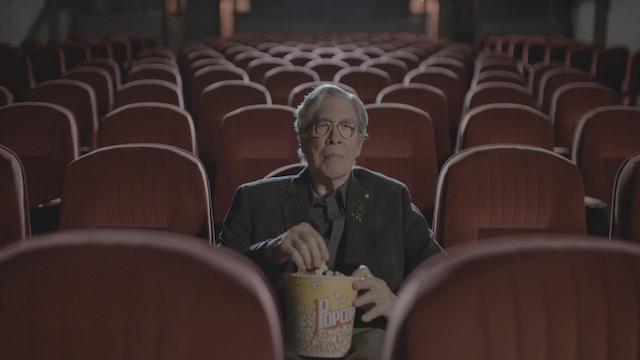With two projects premiering at the Toronto International Film Festival (TIFF) this September, Métis-Algonquin filmmaker Michelle Latimer hopes to empower Indigenous communities through the same medium that has so often been a source of misrepresentation.
While the documentary Inconvenient Indian and CBC television series Trickster are adaptations of popular books by Thomas King and Eden Robinson respectively, both are infused with Latimer’s compelling visual aesthetics and activist tendencies. The latter were clearly demonstrated in her Indigenous resistance docu-series Rise, which placed her amidst the Standing Rock pipeline protests.
Following that hectic experience, working on Inconvenient Indian enabled Latimer to embrace her more meditative side. Then, when returning home to Thunder Bay to scatter her grandmother’s ashes, she devoured Robinson’s Son of a Trickster and couldn’t shake the characters from her head.
“What really stood out to me is that it’s so contemporary,” Latimer told the Nation. “Thomas King talks about how unless we look like the leathers-and-feathers ‘Dead Indian’, we’re not seen. I thought Eden’s characters defied that stereotype completely. They were modern, irreverent, struggling, but magical as well. Her characters leapt off the page with energy.”
Over dinner with Sienna Films co-owner Jennifer Kawaja, Latimer lamented that Indigenous filmmakers generally can’t afford the rights of successful novels. That conversation led to a 50-50 partnership offer to pursue the rights to Robinson’s book. Latimer’s impassioned pitch letter resonated with the acclaimed author, who was impressed by her approach to community consultation and harnessing Indigenous talent on both sides of the camera.
“I’m so tired of people telling me there’s not enough Indigenous people to fill certain roles,” explained Latimer. “I would love to get to a place where there are so many talented Indigenous people for every department on a film set that they don’t know who to hire because there are too many of us to pick from. That would be my dream.”
Trickster is provocative and thrilling magic realism, recalling surreal dramas like Stranger Things and Twin Peaks with a uniquely Indigenous spin. Latimer and co-creator Tony Elliot fill the series with pulsing energy and dark humour, subtly introducing supernatural elements that suggest traditional folklore woven with repercussions of intergenerational trauma.

“We’re not talking about residential school, but you understand the context in a way that’s almost like subtext,” expressed Latimer. “I find that interesting, not hammering the issue over the head but creating a world with all those complexities. Therefore, it elicits a different kind of empathy because it humanizes the issues.”
Trickster stars Joel Oulette as Jared, a charismatic and responsible 17-year-old in northern BC who supports his hard partying and schizophrenic mother by cooking MDMA on the side of his fast-food job. When a mysterious stranger claims to be his real father, things get even weirder.
“I really see Trickster as a healing journey,” Latimer asserted. “Jared is trying to fly under the radar, but he’s overcome with these visions. It’s only when he accepts who he is and where he comes from that he can step into his true power. That is a metaphor for what lots of Indigenous kids go through.”
Latimer credits her creative team with helping to chart the six-episode story arc and, based on Robinson’s second book of the trilogy, is already writing the sophomore season. She appreciates the confidence both Robinson and King have shown in her artistic vision, encouraging her to use the source material as a launching point for exploring ideas.
Inconvenient Indian transcends the documentary genre through immersive cinematography and sound design.
“The beauty of documentary is it’s always a bit of a journey and a discovery,” said Latimer. “I wanted to privilege the image over the voice for people to have a visual experience rather than a narrative one. I wanted it to feel like a piece of poetry or music in that way. It just sinks in and is an experience that takes you over when you’re listening or watching it.”

A Tribe Called Red’s “We are the Halluci Nation” accompanies the film’s hallucinatory beginnings, including a visceral re-enactment of Custer’s Last Stand and rave-y exploration of cultural appropriation at the West Hollywood Halloween Parade. As King provides thoughtful voice-over, he rides through the city in a taxi driven by a trickster-like coyote.
After establishing how the white settler lens has contributed to cultural genocide, Latimer turns the camera to some of today’s most exciting Indigenous creators – visual artists Kent Monkman and Christi Belcourt and filmmakers Alethia Arnaquq-Baril and Nyla Innuksuk.
“This is only a small sampling of the amazing work that is being done across Turtle Island,” Latimer said. “I’ve been following these artists’ work for a long time and been really inspired by them, so it was such an honour to tell a small part of their story. They’re really the ‘inconvenient Indians’ – they’re the ones disrupting, and I love it.”
The film shares King’s subversive humour and provocative spirit, inviting viewers to consider their own complicity in perpetuating harmful stereotypes while demonstrating how contemporary communities are reclaiming traditional cultural practices.
“Thomas King asks the audience to think about where stories come from and how representations are sometimes dangerous, whereas Trickster is really an example of representation,” argued Latimer. “When you fill the roles in front of and behind the camera with Indigenous people this is what a new kind of storytelling can look like. I hope it makes people realize what we are capable of when we have some space and opportunity to really create.”
Photos courtesy of CBC and the NFB





